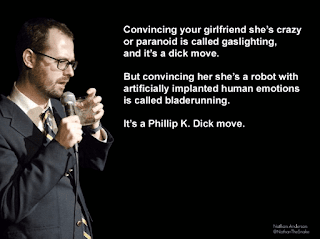Edit: One Week Later: I forgot to mention something. I've long held that any film that begins with a bunch of explanatory text is inevitably crap. Blade Runner 2049 is the exception that proves the rule.
Short Form: It's a good film on almost any criteria, and I recommend seeing it.
It's also a long film. One of the things that speaks volumes of its quality is that since I hadn't checked the length beforehand, I only realised how long it was after the fact. So it's not a minute too long.
(Fun Fact: In the theatre, my only hint that the film was longer than average was the fact that my estimates of the stage where the story was were consistently off.)
And then it's, obviously, a sequel. (After all, what else is there on the big screen these days other than sequels, prequels and remakes?) A sequel of a bona fide classic, too, which is never an easy position, since you have to consider the fans of the original as well as first-time watchers, continuity in both story and look-and-feel, and preferably tell a story somewhere in there too... knowing that your story is always going to be compared to the original's.
I'm convinced a big part of why this effort was as successful as it was is how the writing combined old and new talent. Hampton Fancher (who was one of the writers of the '82 Blade Runner) wrote the story, and had help with the screenplay from Michael Green (whose previous titles include a couple of superhero flicks and some TV work). The combination of respect for the original and awareness of contemporary tastes meshes particularly well here.
And the story they created isn't half bad. It tackles a number of the issues central to Blade Runner (as well as much of Dick's work in general) and mostly does a competent job.
Unfortunately, some holes remain here and there. They're easy enough to overlook while the action is rolling (the pacing is masterful), but the ending leaves a bit to be desired. As much as I wanted to see it in the ambiguous light that worked so nicely for the original, the fact is that the one entirely amoral bastard pulling the strings behind the scenes is kind of ignored towards the end (perhaps he gets his in the inevitable Director's Cut to come?), no problems are actually resolved, and the protagonists' victories remain hollow.
The acting is solid throughout. I've never been a big Ryan Gosling fan, but his portrayal of "K" the replicant cop is thoroughly engaging. Harrison Ford's role is one step above a cameo, yet he's his expected perfect as the aged, battered but never beaten Deckard. Ana de Armas' Joi is soulful and touching; Sylvia Hoeks' deadly competent Luv is a bit uneven as a character but rock-solid in performance.
The single most complex character, however, in my mind is K's boss Lt. Joshi, played by Robin "Princess Bride" Wright. She does a magnificent job as a tough-but-fair career cop dedicated to the force and the duty; her every look speaks volumes of the tightrope life of an honest officer dealing with a dirty job. To pull this off with not a lot of screen time is no mean feat, yet she makes it look easy.
It was a bold move on the creators' part to use so many miniatures instead of the more common CGI. As good as CGI can be (when done well) it tends to lack the physicality of physical props and sets. Here it works exceptionally well, not only in enhancing the dirty and "used" look of the future, but also subtly tying the sequel's visuals to the original's. The utter believability of the future vistas is a major part of why the experience was so immersive.
Another bold move (not) is the sheer amount of skin on show! Or as another reviewer put it, the film is "rather full of naked boobs." It didn't bother me much, but then my perception may well be skewed due to my membership in the presumed target audience. However, I think that most, if not all, of the T&A on display was inanimate or otherwise artificial. If so, it just might be a sly statement of the director's on how everything and then some is sexualised today. But I'll have to watch it again to confirm if my impression was correct.
Another ambiguous area is the ethnic diversity question. All of the major characters are conventionally good-looking white people, of course, but there is some attempt at actually portraying a polyglot future, mostly noticeable in the amount (surprisingly high for a Hollywood film) of non-English-language dialogue. (Lovely Krista Kosonen delivers a full line of actual Finnish, woo!) Something I found pretty clever was the matter-of-fact way the hero responds. Gosling speaks English throughout; but K the replicant, super-competent by definition, never bats an eye whether hearing Spanish, Hungarian, or Somali.
The soundtrack, sadly, was not to my liking. Rather brass-heavy, it went too far in underlining the dramatic twists and turns of the story. It didn't help that the volume at the theatre made the blare of the brass winds really piercing. (I'm still not convinced that the touted digital surround sound comprises anything much other than turning the volume all the way to 11.)
The Bottom Line: I had to dig pretty deep to find something to criticise, didn't I? Ultimately, Blade Runner 2049 is a worthy successor for a classic film. Whether it's an enduring classic itself remains to be seen, but in the current crop of unimaginative remakes and disappointing sequels, it shines bright. It sets the bar so high, one can only hope others will try to surpass it.

No comments:
Post a Comment